NEWS
Our Mission:
To promote the increase of investments in food security and nutrition by local government units, with the aim of aiding the government in eradicating hunger and all forms of malnutrition in the region.
Our Vision:
Anchored on Sustainable Development Goals No. 2 of the United Nations (UN-SDG2), it is our vision that by 2030 no one will go hungry anywhere in Eastern Visayas!
Promotion, protection of breastfeeding practices reap rewards
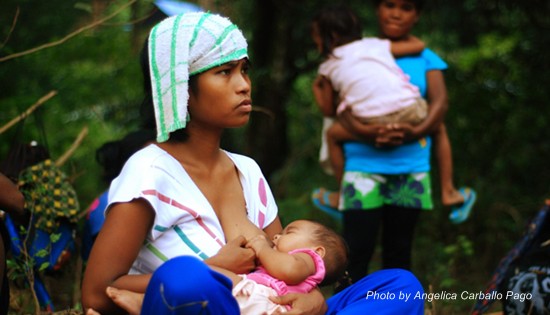
By ANGELICA CARBALLO PAGO
Philippine Center for Investigative Journalism
October 21, 2020
Exclusive breastfeeding among infants 0 to 5.9 months has nearly doubled, from 30 percent in 2003 to 58 percent in 2019.
Women should still breastfeed despite the pandemic, even those found to be positive for Covid-19, according to a Department of Health (DOH) memorandum. This shows how the government has been relentless in promoting breastfeeding in the face of a formidable opponent - milk manufacturing giants who have made their way into the consciousness of Filipino mothers through massive advertising.
Despite the passage of the Milk Code 33 years ago, myths and unfounded beliefs persist amid aggressive promotions by milk manufacturers that claim to give a child advantage in terms of health and IQ points.
Only 35.1 percent of babies are exclusively breastfed until 5 months of age, according to the 2019 Expanded National Nutrition Survey of the Department of Science and Technology - Food and Nutrition Research Institute (DOST-FNRI), although exclusive breastfeeding percentages have been increasing since 2003, but took a dip in 2015.
Nathalie Verceles, director of the University of the Philippines Center for Women's and Gender Studies, said the Milk Code was meant to protect the interest of mothers and babies from aggressive marketing strategies of formula milk companies. (See related story below: Milk and the pandemic: Milk Code confusion cripples LGUs response for infants)
Mothers need support, according to Save the Children Philippines health and nutrition adviser Dr. Amado Parawan. A mother's decision to breastfeed, he said, predates the birth of the child and will depend on what she believes - or is made to believe. This decision can also be affected by the support she gets - or doesn't get - from home, work and community.
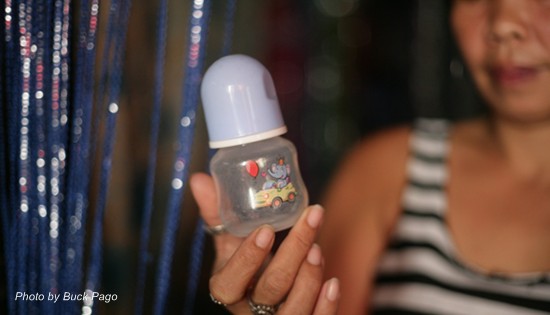
Here's a timeline of breastfeeding policies and how they have influenced breastfeeding rates.
May 1981 - The International Code on Marketing of Breastmilk Substitutes is adopted by the World Health Assembly. The aim is to protect and promote breastfeeding by ensuring appropriate marketing and distribution of breastmilk substitutes.
20 October 1986 - President Corazon Aquino signs Executive Order 51 or the Milk Code with its Implementing Rules and Regulations (IRR). The Code regulates advertising of breastmilk substitutes, including infant formula, other milk products, foods and beverages, feeding bottles and teats.
1990 - Guided by the World Health Assembly resolutions, which state that "follow-on or follow-up formulas are unnecessary because after six months the baby starts to take complementary foods together with sustained breastfeeding," improvements were introduced on the IRR, such as the ban on follow-on formulas. This was prompted by the 1987 Wyeth's invention of follow-on milk for children aged six months and above that undermined the importance of breastfeeding. When the Milk Code was being drafted, follow-on milk was not yet invented. "Complementary food" includes food that is part of the local culture.
2 June 1992 - The Rooming-In and Breast-Feeding Act, Republic Act (RA) 7600, is passed, provides legal basis for rooming-in as a national policy to encourage, protect and support breastfeeding.
2003 - The exclusive breastfeeding percentage among infants 0-5.9 months stands at 29.7 percent.
2004 - The Task Force Milk Code begins discussion and debate on the first draft of the revised IRR of the Milk Code. Among those consulted was Swiss multinational Nestle, who represented formula milk companies.
23 May 2005 - DOH Administrative Order (AO) 2006-0014 or the National Policies on Infant and Young Children is issued. It states that in times of crisis, breastfeeding is the first and best feeding option for infants and young children. It requires mothers and babies to remain together after delivery. Support must be given for mothers to breastfeed even in crisis or emergencies.
2006 - The Pharmaceutical Healthcare Association of the Philippines (PHAP) seeks a temporary restraining order on the revised IRR's implementation. After initially denying PHAP's petition, the court overturns its decision and issues a TRO on the revised IRR.
28 May 2007 - DOH AO 2007-0017 or the "Guidelines on the Acceptance and Processing of Foreign and Local Donations during Emergency and Disaster Situations," states that "Infant formula, breastmilk substitutes, feeding bottles, artificial nipples and teats shall not be items for donation. No acceptance of donation shall be issued for any of the enumerated items."
09 October 2007 - The revised IRR of the Milk Code takes effect after the Supreme Court partially upholds its validity. It strikes down certain provisions, such as the prohibition on advertising and promotion of breastmilk substitutes and introduces sanctions not found in the law.
01 April 2008 - The Department of the Interior and Local Government releases AO 2008-0055, or the "Guidelines on the acceptance and processing of foreign and local donations during emergency and disaster situations." It endorses DOH AO 2007-0017 to all local government units.
2008 - The exclusive breastfeeding percentage among infants 0-5.9 months rises to 35.9 percent.
16 March 2009 - RA 10028 or the Expanded Breastfeeding Act, which amends RA 7600, is signed by President Gloria Macapagal Arroyo. It establishes standards for workplaces, health facilities (with the establishment of milk banks) and public places, and calls for breastfeeding breaks and designated facilities in the workplace.
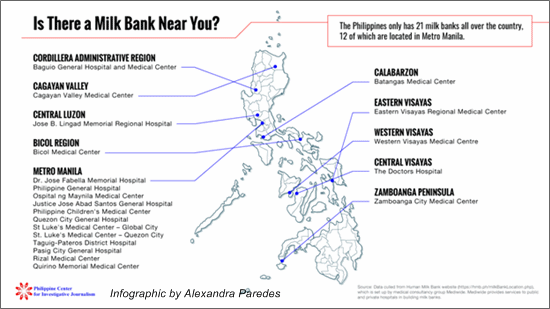
2011 - The exclusive breastfeeding percentage among infants 0-5.9 months rises anew, to 48.9 percent.
21 December 2012 - RA 10354 or The Responsible Parenthood and Reproductive Health Act of 2012 is signed by President Benigno Aquino III. It includes breastfeeding as an element of reproductive health care and provides a basis for breastfeeding promotion and education.
2013 - More than half, or 52.3 percent, of infants 0-5.9 months are exclusively breastfed.
2015 - The exclusive breastfeeding percentage among infants 0-5.9 months dips for the first time to 48.8 percent.
29 November 2018 - RA 11148 or the "Kalusugan at Nutrisyon ng Mag-Nanay Act" is signed by President Rodrigo Duterte. The law seeks to address the malnutrition of infants and young and lactating women.
2018 - The exclusive breastfeeding percentage among infants 0-5.9 months recovers slightly to 54.9 percent.
17 April 2019 - RA 11311 or "An Act to Improve Land Transportation Terminals, Stations, Stops, Rest Areas and Roll-On/Roll-Off Terminals, Appropriating Funds Therefor and for Other Purposes," establishes lactation stations in transport terminals, stations, stops and rest areas.
2019 - Exclusive breastfeeding improves to 57.9 percent.
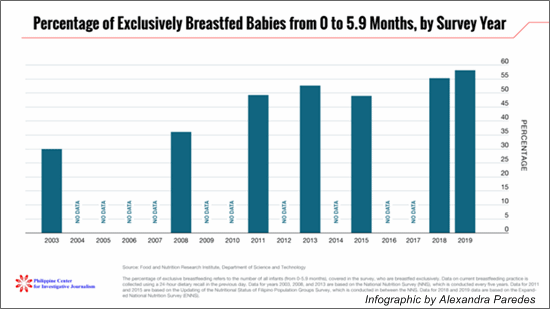
11 May 2020 - DOH Memorandum No. 2020-0237 or the "Interim Guidelines for the Delivery of Nutrition Services in the Context of COVID-19 Pandemic" states that mothers who are asymptomatic, or those with close contacts, suspect, probable, or confirmed case of COVID-19 who do not have severe illness and/or who are not in respiratory distress, can continue breastfeeding, provided that they observe strict infection control measures.
15 May 2020 - DOH Memorandum No. 2020-0231 or the "Guidelines on the Standardized Regulation of Donations, Related to EO 51," provides guidelines on how LGUs can help provide nutrition for non-breastfeeding children under 3 years old. While donations are banned as stipulated in various laws and orders, LGUs can procure formula milk and give them to identified families. The memorandum still upholds the promotion and protection of breastfeeding for infants and young children.
Sources:
Food and Nutrition Research Institute for breastfeeding data
Babymilkaction.org for Milk Code RIRR timeline
Milk and the pandemic: Milk Code confusion cripples LGUs response for infants
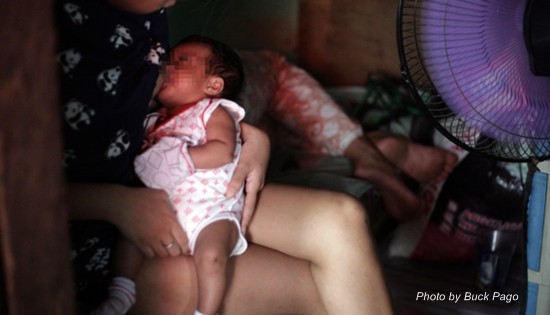
By ANGELICA CARBALLO PAGO
Philippine Center for Investigative Journalism
October 8, 2020
The indiscriminate distribution and use of breastmilk substitutes, especially during emergencies, can change feeding practices and put babies at greater risk of illness.
What you need to know about this story:
• Experts are calling for measures to ensure the health and safety of infant and young children, which can easily be undermined by the milk industry's aggressive marketing initiatives.
• The Milk Code does not ban formula milk procurement and distribution by local government units, provided they follow guidelines set by the Department of Health (DOH).
• Marketing and advertising of products within the scope of the Milk Code, however, are prohibited. Donations of formula milk and breastfeeding substitutes from manufacturers and distributors of these products are banned.
• Local government units are clueless to the finer details of breastfeeding and infant and young child nutrition laws, to the detriment of mothers, infants and young children in need especially during the current Covid-19 crisis.
• Milk companies use disasters and crises to market their products, and DOH data show a rise in Milk Code violations during the enhanced community quarantine period.
Here's one unintended consequence of the Covid-19 health emergency: Parents and guardians are desperately finding ways to feed their babies, with some even begging on the streets or on social media. With lockdowns making it harder to provide proper and adequate food for the family, their health and nutrition -- especially of babies -- are at risk.
Local governments attempted to solve the problem by distributing formula milk to mothers, only to find out that donations are not allowed by the Milk Code, a 1986 law regulating the marketing and distribution of breastmilk substitutes.
Worse, formula milk makers seem to be taking advantage of the situation to undermine strict government regulations, experts observed.
During the Enhanced Community Quarantine (ECQ) in March, Maryjoy Mota, a 37-year-old resident of Antipolo, posted on the Antipolo City Facebook group that her two-month-old granddaughter needed diapers and formula milk.
Maryjoy's daughter, 17-year-old Hazel, had just given birth to Pia (not their real names), two weeks before the ECQ was enforced throughout Luzon in mid-March. Maryjoy's post drew a hundred other comments from mothers and guardians in the same situation.
With Hazel giving birth to Pia two weeks ahead of her due date, the doctor immediately prescribed a formula milk brand, PreNan, developed for premature newborns. Weighing just 1.7 kilograms, the baby had to be placed in an incubator.
"We were not given any other options or brands, nor given any instructions or assistance to start breastfeeding," Maryjoy said.
Even when Hazel went for check-ups at the barangay and the district health centers before she gave birth, there were no instructions on breastfeeding, which could have helped them save some money instead of spending it on formula milk, she said.
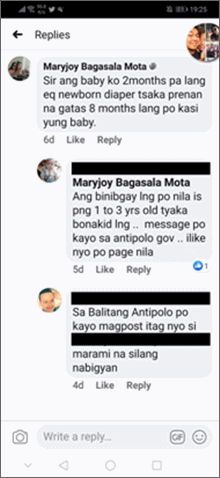
Sought for comment, an official of the Rizal Provincial Hospital System - Antipolo Annex 1, who asked not to be named, insisted that the hospital followed breastfeeding protocols. But Pia weighed below the 2.5-kilogram birth weight threshold and showed signs of sepsis, the official said.
The formula milk prescribed to Pia met the baby's caloric requirements, which might not be sustained by breastfeeding, the official said.
But with no income, it was impossible to buy the 400-gram can of milk, which costs P641. Maryjoy's common-law husband, Ricky, lost his construction job because of the pandemic, while Pia's parents were unemployed teenagers.
While some local leaders were aware of the plight of new mothers like Hazel, the Milk Code posed an obstacle. Sangguniang Kabataan Chairman Arky Manning of Barangay San Isidro in Taytay, Rizal learned this the hard way.
The Department of Health (DOH) gave Manning a memo for violating Executive Order (EO) 51, or the Milk Code of 1986, by "accepting and distributing milk formula donations" given to mothers with infants in Taytay in April and May 2020.
Manning explained that it was part of the "Tulong Kay Baby" (help for baby) project, a donation drive that he had organized with his friends. They bought milk and diapers using funds given by private individuals. No mass distribution or random donation of milk happened, he claimed.
Manning was one of the 291 violators flagged by the DOH from March 1 to July 24, largely covering the ECQ period in Luzon. Reports of violations came from the general public, submitted through http://mbfp.doh.gov.ph. MBFP, which stands for DOH's Mother and Baby-Friendly Philippines, is the reporting platform for violations of the Milk Code and the Expanded Breastfeeding Act of 2009 (Republic Act 10028).
The list of violators included health workers, non-profit organizations, and local executives such as Manning, and Mayors Andrea Henares of Antipolo City and Marcy Teodoro of Marikina City. Also on the list were celebrities such as Say Alonzo and Marian Rivera Dantes, who together with Nido, a brand that Dantes endorses, and the YesPinoy Foundation, were reported to have distributed follow-on formula. Dantes even posted it on Instagram to her 9.4 million followers.
EO 51 issued by former President Corazon C. Aquino, otherwise known as the Philippine Milk Code of 1986 or simply, the Milk Code, regulates the marketing of breastmilk substitutes, including milk formula, breastmilk supplements and other similar products by prohibiting the advertising and promotion, whether written, audio or visual, for such products. It adheres to the International Code on Marketing of Breastmilk Substitutes, adopted by the World Health Assembly in May 1981. Breastfeeding advocates have hailed the Milk Code as one of the strongest breastfeeding protection laws in the world.
The Milk Code's Revised Implementing Rules and Regulations (RIRR), released 30 years after the law was signed, prohibits the donation of infant formula and breastmilk. Administrative orders from the DOH and the Department of the Interior and Local Government (DILG) further disallow the donation of infant formula milk and breastmilk substitutes in times of disasters and calamities.
According to data from the Food and Nutrition Research Institute, exclusive breastfeeding rates have continuously gone up in the last 10 years, reaching 57.9 percent in 2019. The global exclusive breastfeeding rate stands at 41 percent. The United Nations targets to increase global breastfeeding rates to 50 percent by 2025.
Marketing is prohibited, the milk is not
Health Undersecretary Maria Rosario Vergeire said the law did not bar local government units (LGUs) from procuring formula milk.
"If local government units procure formula milk, the law does not cover it. EO 51 is a regulatory tool used by the Department of Health to regulate the advertisement of manufacturers that formula milk is more important than a mother's milk. That's our first objective -- we would like to know that breastmilk is still the best for babies," she said.
DOH Memorandum No. 2020-0231, dated May 15, 2020, laid down the guidelines on the standardized regulation of donations covered by the Milk Code. Formula milk and breastmilk substitutes can still be provided to those in need, with the following conditions:
1. The local government unit buys it using its own budget (procurement);
2. Breastmilk should still be the first choice and the procured formula milk is given to identified mothers/infants, not distributed en masse;
3. Distribution, preparation and use of breastmilk substitute and formula milk must be done under the supervision of health and nutrition workers;
4. There should be no brand name, logo or identifiable marks of the manufacturer; and
5. No public relations, announcement or the likes may occur.
Dr. Mianne Silvestre, executive director of Kalusugan ng Mag-Ina (mother's health) Foundation, echoed Vergeire's explanation.
"The Milk Code is there to regulate the marketing and advertising of formula milk and breastfeeding substitutes, and not to penalize parents who give these products to their children," Silvestre said. "Nobody goes to jail for feeding formula milk to their babies."
Sharing a similar view, Dr. Paul Zambrano, a technical specialist at Alive and Thrive, a private initiative to reduce child undernutrition by improving infant and young child feeding practices, said: "Marketing (of formula milk and breastmilk substitutes) will undermine the practice of breastfeeding and complementary feeding with healthy food after six months. It's meant to save lives. It is meant to prevent the top killers of children in that age group - diarrhea and pneumonia."
The problem, Silvestre said, was that formula milk was being marketed as the first option instead of breastfeeding. This goes against the hierarchy of infant feeding choices laid out in the Global Strategy for Infant and Young Child Feeding published by the World Health Organization (WHO), which states that donated breast milk from a wet nurse or milk bank takes precedence over formula milk.
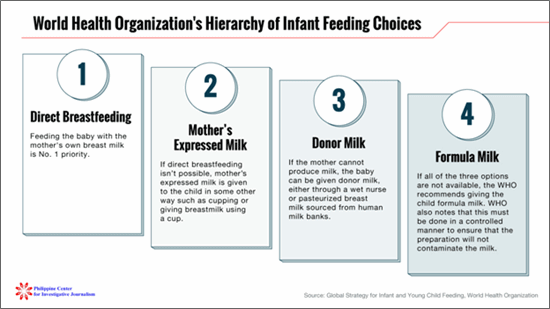
Even for Covid-19 positive mothers, the WHO still recommends continued breastfeeding and rooming of babies with their mothers. Transmission of Covid-19 through breastmilk or breastfeeding has not been established.
No guidance for LGUs
What can and cannot be done under the code does not seem to be clear to local governments, even to the DILG. In an interview with PCIJ, Interior Undersecretary Jonathan Malaya, affirmed that the ban extends to selective distribution of milk to identified mothers and babies and referred to the National Nutrition Council website for guiding policies.
Taytay's Manning said no guidance came from any government agency, particularly the DOH or DILG, on how they could respond to the needs of mothers and their babies.
During the quarantine, local officials, such as Quezon City Councilor Ariel Inton, repeatedly appealed to the DOH to lift the ban on milk donations.
In a Facebook livestream, Inton, a lawyer, gave practical advice to barangay officials planning to distribute formula milk to their constituents. "Tell them that you are handing it out as loans or ask for coins so they won't say it's a donation, so you can give the children something to eat," Inton said.
For Ynares, while the Milk Code has an important purpose, it can also be a "bane during crisis."
"It poses a huge challenge for families and the government to provide essential nutrition required for child growth and development particularly during extraordinary times," the Antipolo City mayor said.
A National Nutrition Council advisory said that LGUs should consider that some recipients of pandemic relief goods have young children and pregnant and lactating mothers. Families are supposed to be monitored by Barangay Nutrition Scholars and Barangay Health Workers, who will provide them with low-cost, one dish-meal recipes as well as recipes utilizing their relief goods.
But Maryjoy said there were no vegetables and nutritious food in their relief packs. The lack of proper nutrition may have affected her daughter Hazel's milk supply, she said.
"The first relief pack we received had three kilos of rice, two cans of sardines, and two Lucky Me noodles," she said.
There was one instance, Maryjoy said, when her family received a few kilos of rice and 16 pieces of dried fish (tuyo). To increase Hazel's milk, Maryjoy bought malunggay and cooked it with noodle soup.
While the DOH had specifically instructed that assistance should be provided to breastfeeding mothers, Maryjoy said no one from her barangay came to ask how her daughter and granddaughter were doing. "They only gave me a 150-gram pack of powdered Bear Brand milk, only for her to drink, but none for the baby," Maryjoy recalled.
The usual relief pack distributed by LGUs during the quarantine period contained a few kilos of rice, canned goods and instant noodles. The nutrition council however urged LGUs to include dark green and yellow vegetables; root crops; legumes, beans and seeds; fruits; poultry and eggs; meat or fish; and pasteurized fresh milk.
Only a few cities and municipalities were able to distribute fresh produce.
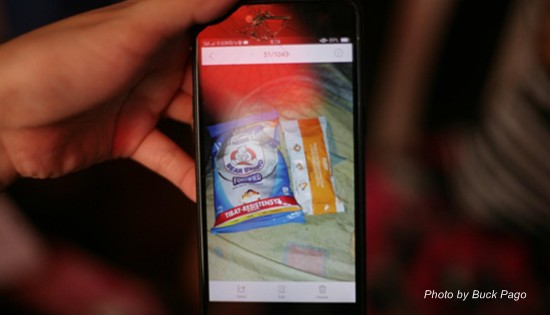
"We are in a crisis situation, and even the government's hands are tied because of supply chain problems. The local government units have to procure thousands and thousands of produce to give to their constituents who need it not now, but yesterday. That is the limitation, and we understand when canned goods are distributed given the situation," said DILG's Malaya.
Malaya pointed out that on top of the relief packs given to households, a one-time cash assistance was given in the form of the Social Amelioration Program (SAP).
"The family can go to the market and buy what they think is nutritious food for lactating mothers. The government has already provided funds for them and they can make that choice if they wish to," Malaya said.
But for Maryjoy, the SAP she received had to be divided among three households.
"The P6,500 is to be divided among three families, with each receiving P2,000, but I get to have the extra P500 because it was I who lined up for that money," Maryjoy said. Most of what she got eventually went to repaying debt incurred when her husband lost his job.
Milking disasters
Breast or bottle? This question remains contentious. Since the Milk Code was enacted in 1986, the milk industry has taken advantage of every possible loophole to undermine the law. When the Milk Code took effect in 1987, international milk manufacturing company Wyeth invented the follow-on formula for babies six months old and beyond.
The Milk Code's implementing rules and regulations (IRR) were revised to include a ban on advertising follow-on formula in 1990. A revised IRR was drafted in 2006, adding further safeguards 30 years after the Milk Code was signed, but this was challenged all the way to the Supreme Court.
A report released in May 2020 by WHO, United Nations Children's Fund and the International Baby Food Action Network said that despite the pandemic, milk companies continued to skirt laws in many countries and continuously promoted their products.
"There is no guarantee that these donations will occur over the long term," said Dr. Nathalie Africa-Verceles, director of the University of the Philippines Center for Women's and Gender Studies. "The intention really is to introduce the product and to generate dependence with the belief and the hope that women will continue to patronize the products that they were provided for free initially."
Studies have shown that mothers exposed to breastmilk substitutes were highly likely to abandon breastfeeding, and the indiscriminate distribution and use of formula milk put infants at greater risk of illness, which might be fatal.
A study in Indonesia in the aftermath of the May 2006 earthquake in Yogyakarta and Central Java found that the distribution and use of breastmilk substitutes resulted in changes in feeding practices. Uncontrolled distribution of infant formula exacerbated the risk of diarrhea among infants and young children during the emergency, the study found.
"(The Milk Code) is very relevant because let's look at what the companies do during times of emergencies, they use it to try to market the product," said Zambrano.
DOH data confirmed these observations. The health department noted that a rise in reports of Milk Code violations from the public began to occur in the week when the strict lockdowns began, peaking during the week of April 6 to 12 with 90 cases.
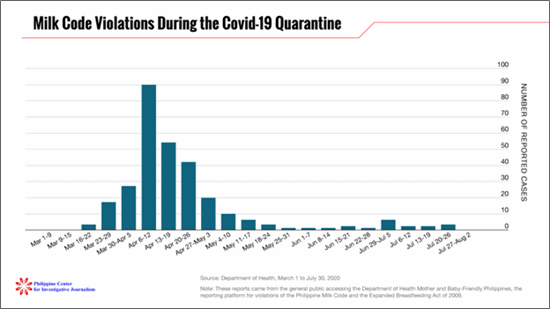
Apart from solicitations, there were product advertisements, such as Marian Rivera-Dantes' Instagram post. Corporate and private donations also happened online, mostly through Facebook posts, according to the DOH data.
Zambrano pointed out that the relevance of the Code had always been questioned during emergencies. He recalled a situation in Cagayan de Oro after typhoon Sendong in 2011 when distribution of formula milk became rampant.
Silvestre downplayed the matter and said only a few mothers were unable to breastfeed their babies due to medical or physical reasons.
"These few cases are being hyped up to rationalize the lifting of the prohibition during emergencies. When in fact, it is during emergencies when we should intensify the protection of mothers to enable them to breastfeed their babies," Silvestre said.
Formula milk manufacturers have been accused several times of unscrupulous means of advertising their products, targeting mostly low-income families or those who can least afford their product.
A 2018 report from Save the Children Philippines revealed that baby formula brands in the Philippines are using "aggressive, clandestine and often illegal methods" to get poor mothers to choose their product over breastfeeding.
Hospital staff also gave brand-specific recommendations to mothers who had just given birth, clearly a violation of the Milk Code. The report named Nestle, Abbott, Mead Johnson and Wyeth as the companies who are using these illegal tactics.
All four companies denied the allegations in separate statements sent to the Guardian in 2018.
Cheapest, but not the best
Hazel is helping her mother with their online selling business, earning a few extra pesos to help augment their family's income. She expects breastfeeding to be temporary and will likely go back to feeding Pia formula milk.
Maryjoy said they had begun feeding Nestogen One to Pia, the cheapest in the market at P78 per box. It wasn't prescribed by the doctor.
"But Pia doesn't want it, she won't swallow it," Maryjoy said.
As Hazel handles deliveries and client meet-ups for their online selling business, Maryjoy has no choice but to give Pia formula milk.
"I need to go back to school," Hazel said.
Asked where they will get the money to buy formula milk, Hazel shrugged. -- PCIJ, October 2020
Editor's Note: The real names of Hazel and her baby, Pia, were not used because they are minors.
5 DAR-assisted farmer organizations are town's food supplier amidst COVID-19 crisis
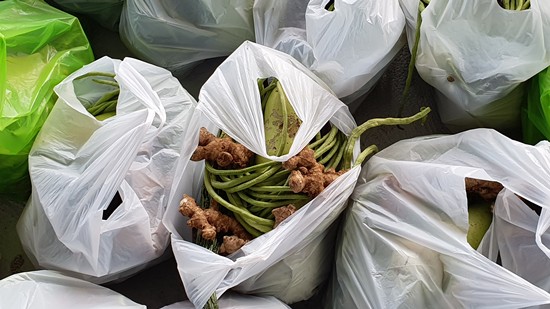
By GABRIEL MARK OCENAR
April 25, 2020
CALBIGA, Samar - They used to supply vegetables and other farm products for the feeding program in Day Care centers throughout this town.
Now, Samar Provincial Agrarian Reform Program Officer Celsa Mabutin disclosed that the local government unit (LGU) is buying all the agricultural products of these five Department of Agrarian Reform (DAR)-assisted farmer organizations here to feed its residents during this global crisis due to the coronavirus disease 2019 (COVID-19) pandemic.
Mabutin further disclosed that the five agrarian reform beneficiaries organizations (ARBOs) are the Calbiga Vegetable Growers Association, Panayuran Upland Farmers Association, Brgy. Bulao Farmers Association, Canbagtic Farmers Association, and Borong Active Farmers Association.
The farmers' products will give variation to the canned goods commonly provided during relief assistance distribution. With this move, the LGU is incorporating nutritious foods to every household.
According to Municipal Nutrition Action Officer and member of the Municipal COVID Task Force, Evelyn Jabonete, in a Facebook post by the National Nutrition Council Region VIII, available sources of foods in the locality during the quarantine period is very important.
Instead of transporting our agricultural products to other areas, let us serve these to our local households, she added.
With the temporary suspension of holding "tabo" or flea market pursuant to Executive Order No. 10, series of 2020, issued by Mayor Melchor Nacario, as a precautionary measure to prevent the spread of COVID-19, the LGU buy and pick-up all the farmers' harvests in their respective areas.
Among the ARBOs' products purchased by the concerned LGU include: string beans, upo, eggplant, bitter gourd, banana, sweet potato, cassava, corn, sweet pepper, gabi, pineapple, loofah, Baguio beans, tomato, okra, hot pepper, ginger and papaya.
Based on the sales record of the five ARBOs, they earned a combined amount of more than P288,000 from April 3 to 8 and April 13 to 17, or during the quarantine period.
Though the town is now under enhanced community quarantine effective April 15 to 30 this year, pursuant to Executive Order No. 11, series of 2020, issued by Nacario on April 14, farmers and fisherfolks will be given exemption passes by the Municipal Agriculture Office to go about their daily routine for food security considerations.
Furthermore, DAR-8 Regional Director Stephen Leonidas ordered the field implementers to provide the agrarian reform beneficiaries and ARBOs throughout the region the agency issued quarantine accreditation pass, as authorized by the Inter-Agency Task Force for the Management of Emerging Infectious Disease (IATF-EID), for the continuous supply of agricultural products.
These five ARBOs, Mabutin said, are recipients of DAR's Partnership Against Hunger and Poverty (PAHP) program, which is in collaboration with the Department of Social Welfare and Development (DSWD) and the LGU.
Under this collaboration, the LGU purchases farm products from the ARBOs for the feeding program in Day Care Centers of the DSWD.
Save the Children Philippines to LGUs: No Milk Formula in the time of COVID-19
By Save the Children Philippines
April 17, 2020
MANILA -- Save the Children Philippines is urging local government units (LGUs), private groups, charitable organizations and individuals to adhere to existing laws that prohibit the distribution of infant formula or breastmilk substitute as part of relief goods to encourage breastfeeding among mothers, ensure good health and adequate nutrition of infants and young children.
Atty. Alberto Muyot, Chief Executive Officer of Save the Children Philippines, said nutrition and health support to children, pregnant and lactating mothers must be integrated into the national and local government response during the COVID-19 pandemic including the promotion of breastfeeding.
Several cities and municipalities have been distributing milk formula as part of relief goods to their constituents, which raised concerns of breastfeeding advocates.
"Children suffer the worst impact of the COVID-19 pandemic due to rising levels of poverty, ill-health, and malnutrition," said Atty. Muyot. "We call on local governments to support parents and guardians by encouraging mothers to breastfeed, and provide access to affordable and healthy food."
He said donations of infant formula in times of disasters, calamities, and emergencies including pandemic are strictly prohibited under the Milk Code or Executive Order 51 of 1986, the Expanded Breastfeeding Promotion under Republic Act 10028, and the Republic Act 11148 or Kalusugan at Nutrisyon ng Mag-Nanay Act which is being implemented nationwide. Save the Children Philippines joins the Department of Health and the National Nutrition Council in calling all LGUs to strictly adhere to these laws and guidelines, especially during emergencies like the COVID-19 pandemic.
These laws mandate local government units to establish milk banks during emergency situations to provide access to breastmilk when mothers become sick or not able to breastfeed their babies. The milk banks will provide a venue for lactating mothers who wish to donate their breastmilk.
Dr. Amado Parawan, Health and Nutrition Advisor of Save the Children Philippines said breastfeeding during the COVID-19 pandemic is highly encouraged to strengthen the immune system of babies, protect children from respiratory and gastrointestinal illnesses, prevent malnutrition, and ensure bonding between the mother and her baby. He said breastmilk is safe and ensures babies grow up healthy, and increases IQ.
"Breastmilk is the best source of nutrition for babies and there is no milk formula that can provide the same optimum health and nutrition benefits to infants and young children," said Dr. Parawan.
He added that colostrum -- the first milk formed after the delivery of the newborn contains antibodies that protect the newborn against diseases. Recent studies also state that colostrum has properties against diseases caused by viruses.
He said mothers, even those infected by COVID-19, can still continue breastfeeding while limiting the baby's exposure to the virus by using respiratory precautions. Mothers who have been infected by COVID-19 may choose to breastfeed, but they must wear a facemask and wash hands thoroughly with soap and water. "There are no clear scientific studies that the Coronavirus can be transmitted through breastmilk," said Dr. Parawan.
Also, mothers who are sick can choose to manually express breastmilk to maintain milk supply. These mothers should wash their hands properly before doing breast milk expression.
Dr. Parawan said expectant mothers should eat healthy food, maintain personal hygiene, and take iron folic supplements. Breastfeeding mothers must have a support system through their husbands, partners, and other members of the family.
He reminded pregnant mothers to go to birthing facilities, lying-in clinics, and infirmary with a midwife, nurse, or doctor as many hospitals are crowded with COVID-19 patients. He also advised mothers giving birth to seek help from health and nutrition workers and breastfeeding support groups when facing difficulties in initiating and continuing breastfeeding.
Save the Children Philippines advocated for the passage of First 1,000 Days law or RA 11148, which mandates exclusive breastfeeding for babies up to six months and continued breastfeeding up to two years while starting complementary feeding.
"Children, including pregnant and lactating mothers, are most vulnerable during COVID-19 pandemic, and local government units should prioritize their health and nutrition," said Dr. Parawan.
